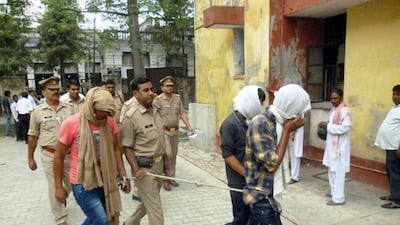Dozens of Indian university professors have been accused anonymously of sexual harassment in a controversial online campaign inspired by the Harvey Weinstein scandal.
The Hollywood mogul has been accused by nearly 60 women of sexual crimes ranging from harassment to rape. As the accusations mounted, the actress Alyssa Milano started a #MeToo hashtag on October 16 to encourage women from around the world to share their stories of sexual harassment so that it might be possible to gauge the magnitude of the problem.
A similar campaign in India has resulted in a Facebook list of more than 70 professors, all well-known in academia and liberal circles. Some work at prestigious institutions such as Delhi University, Jawaharlal Nehru University and the Film and Television Institute of India.
Only their names and the names of their universities are given. No details of the crime — the place, date, nature of the assault — are provided. The women making the accusations, unlike the Hollywood actresses who have complained about Mr Weinstein, have not revealed their identities.
The list was posted on her Facebook page by Raya Sarkar, an Indian-origin law student at the University of California. She said 300 women responded when she put out a notice asking female students in India to contact her if they had been sexually harassed by lecturers, although not all of them named the man responsible.
In an interview with the Indian Express newspaper, Ms Sarkar said she herself had not suffered any sexual harassment by the faculty while studying law at the O P Jindal University in India's Haryana state.
Asked why she started the list, she said: "Because I feel Harvey Weinstein's case has started many discussions and people are now more open to believing victims … The list is primarily for students to be wary of these professors because in my opinion — knowing how college administrations function — these harassers will continue to hold their positions of power."
Since no details of the alleged crimes have been given, it is impossible for the men on the list to even begin to prove their innocence. None of them has responded to media requests for comments although one, a professor at Delhi University, is reported to be planning to file a defamation suit.
The naming and shaming has divided opinion. Fourteen of the country’s top feminists issued a statement criticising the campaign and urging Ms Sarkar to withdraw the list.
‘It worries us that anybody can be named anonymously, with lack of answerability. Where there are genuine complaints, there are institutions and procedures, which we should utilise," they said.
While acknowledging that "the process is harsh and often tilted against the complainant", the activists said: "This manner of naming can delegitimise the long struggle against sexual harassment, and make our task as feminists more difficult,’ they said.
Sexual harassment of women is a chronic problem in India. Earlier this month the Indian capital, New Delhi, was paired with Sao Paulo in Brazil as the world’s worst megacities for sexual violence against women in a poll by the Thomson Reuters Foundation.
But the country also regularly witnesses vigilante justice, most recently the mob lynchings of people suspected of eating or trading in beef, which goes against the veneration of cattle by India's Hindu majority. There is also a long history of people who enter relationships with someone from a different caste or religion being punished or killed on the orders of village councils.
The idea of using similar tactics to target sex offenders troubles many women. Seema Mustafa, editor of the online newspaper The Citizen, voiced her objections in an article published last week. "I see little difference between these vigilantes in the name of feminism, and the right-wing vigilantes seeking to punish people on grounds of morality or food habits," she wrote. "The concept is the same, just the method different."
Those who support the Facebook list argue that the legal process in India is so slow, and the heads of institutions such as universities so unresponsive, that the only way to shake things up is by publicly humiliating of high-profile offenders.
Mihira Sood, a supreme court lawyer, said she saw no problem with "crowd-sourced" lists.
''I don't believe that the legal process is the only way that someone can say she has been sexually harassed," she said in a television debate. "We have a multiplicity of fora, and legal processes often fail the victim. But the victims should have revealed their names so that the accused have a way of responding to the allegations made."
Dr Jhuma Sen, a law professor at O PJindal University, said she understood the frustration over the slow delivery of justice but saw no alternative. "We can talk about how the ‘system’ has failed but we must approach the system first in each of these cases and not just throw a bunch of names together. Justice is hard-earned and there are no short cuts like simple lists."
But Ms Sarkar is defiant, and has accused her critics of being part and parcel of power structures that needed to be dismantled, and even of benefiting from these power structures.

